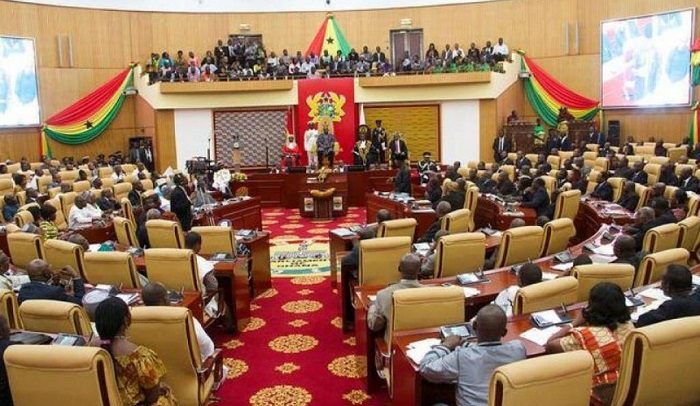Parliament yesterday passed the government’s flagship tax legislation on electronic transactions, which is set to rope in more people into the tax bracket after a boycott by the opposition lawmakers.
The Electronic Transfer Levy (E-Levy), which was first pegged at 1.75% in the 2022 Budget Statement and Economic Policy of the Government presented to the House in November last year, was passed at 1.5% with Speaker Alban S.K. Bagbin in the chair, after returning from a medical leave.
The NDC Minority, which has 137 out of the 275 seats in the chamber, had opposed the bill, leading to a standoff that travelled for more than three months.
On December 21, 2021, a beastly scene occurred on the night in the chamber of Parliament, with MPs openly throwing punches when the E-Levy was being voted upon by MPs on whether it should be taken under a certificate of urgency.
Before the E-Levy Bill was brought to the House, the Finance Committee handled it at the committee level where they were also split on the bill, with 12 of the Majority NPP MPs endorsing the bill to be sent to the floor whilst another 12 NDC MPs said they were rejecting it.
As a result, the Chairman of Committee, Kwaku Agyemang Kwarteng, NPP MP for Obuasi West, had to break the tie by voting to make the Majority 13 as against the Minority’s 12.
Even though there were no ugly scenes in the House floor yesterday, the watershed bill was not passed without drama, with NDC MPs boycotting the proceedings at the eleventh hour upon seeing that it was short of the numbers needed to block the bill from going through, having participated fully in the debate.
NDC MP for Ajumako-Enyan-Esiam, Cassiel Ato Forson had argued that the tax’s structure had an inherent disproportionate effect on lower-income people and those outside the formal banking system who rely heavily on mobile money transfers.
Floor Antics
According to him, the tax was “regressive and abusive” since its “structure is taking money from people’s pocket” and that “it is a tax on mobile money” and protested the varying of the Order of Business in the House to take the motion on the E-Levy Bill for a second reading.
Other NDC MPs who spoke on the motion indicated that the Minority members were determined to block a vote on the E-Levy, and therefore resorted to delaying tactics with dragging speeches, accusing the Majority caucus of springing a surprise on them and insisting that the Minister of Transport be made to answer their questions first with the view to end the allocated time for it, so that no motion can be moved.
The filibuster by the opposition NDC members was again witnessed during the debate; taking turns to stage monologues in the chamber, after the motion was eventually moved by the Finance Minister, Ken Ofori-Atta.
This was because some of their members, including the MP for Jomoro, Dorcas Affo-Toffey; Assin North MP, James Gyakye Quayson; and for Ketu South, Abla Dzifa Gomashie, were said to be absent from Parliament.
The opposition MPs repeatedly shouted down the motion with chaotic chants: “Don’t tax MoMo; don’t tax MoMo.”
After almost an hour of debate, the NDC MPs relented and walked out of the chamber when the question was about to be put for the House to adopt the report of the Finance Committee, while the bill was also crossing the hurdle of Second Reading.
The Minority Leader, Haruna Iddrisu, who called for the walkout, after having a bite on the debate, said his side did not want to be part of the parliamentary history of having passed a law with consequential effect on the poor’s pocket.
Later on, he held a press conference saying the boycott of the Minority meant there was no quorum for the House to take a decision, and that they intended to file a motion to question the legitimacy of the passage of the bill at the Supreme Court.
According to him, the decision by the Speaker of Parliament, Alban S.K. Bagbin, to allow a vote by the Majority New Patriotic Party (NPP) was unconstitutional since the House did not have a voting quorum.
Counter
But, the Majority Leader, Osei Kyei-Mensah-Bonsu, said there was no issue of quorum and that the House was properly constituted at the time the decision was taken.
According to him, Parliament has done what is good for the country, saying, “As a House, we should also position ourselves to monitor the proceedings. It’s been quite a while” and that the effect of the delay in passing the bill has not been good.
“Over the past three months, there was considerable uncertainty about our revenues and Ghanaians, investors and even the GRA were worried, which explains why there was a lot of speculation in the system,” he noted.
He stated that this led to the downgrading of the country and the downward spiral of the cedi, raising the cost of living.
So the passage of the bill meant that Ghana will have a stake in the monies that accrue from mobile money transactions, Mr. Kyei-Mensah-Bonsu indicated at a press briefing.
NDC Suit
Meanwhile, the three NDC MPs; Haruna Iddrisu, Mahama Ayariga and Samuel Okudzeto Ablakwa, have reportedly filed a writ at the Supreme Court against the Attorney General, Godfred Yeboah Dame, seeking a declaration that on the authority of the apex court in the case of Justice Abdulal v. Attorney General, Writ No. 31/07/2022 dated March 9, 2022, the constitutional quorum number for decision-making and voting within the meaning of Article 104(1) of the 1992 Constitution is 138 Members of Parliament out of the 275 Members of Parliament and not 137 Members of Parliament.
BY Ernest Kofi Adu, Parliament House


